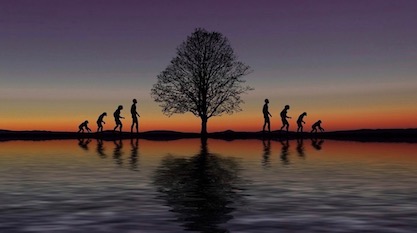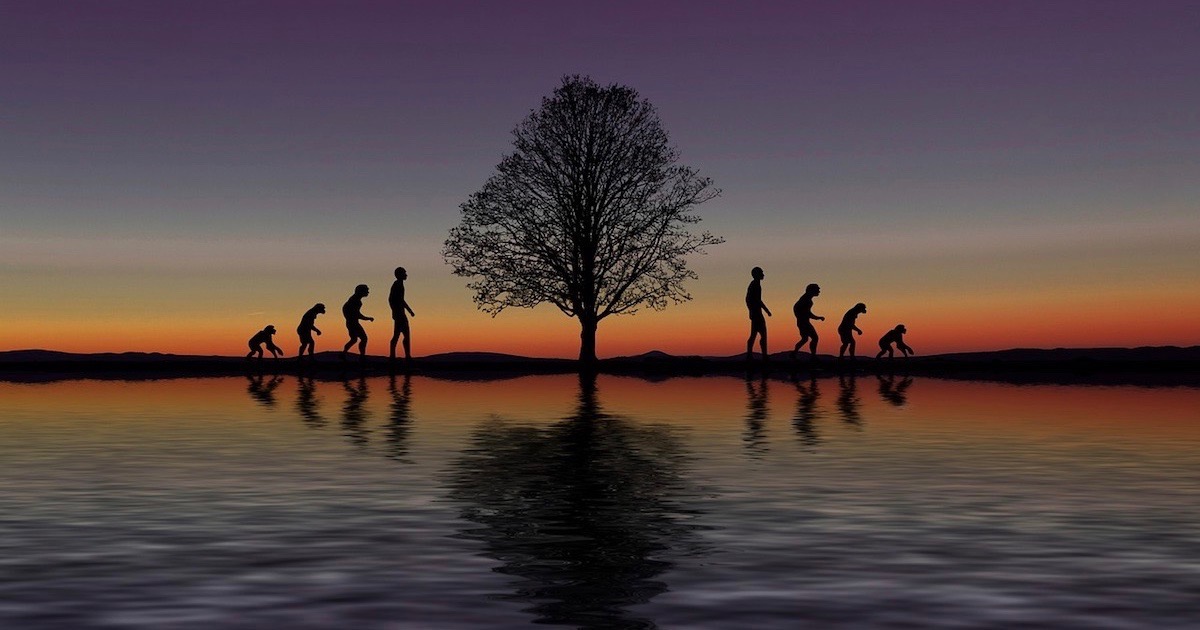 Education
Education
 News Media
News Media
From The Atlantic on Teaching Human Evolution, a Bit of Rare Honesty in Reporting


If you’ve read enough articles from mainstream journalists about how evolution is taught in public schools, and about Discovery Institute’s position on that, you’re bound to have low expectations of a new article that just came out from The Atlantic. “I Was Never Taught Where Humans Came From,” laments staff writer Olga Khazan about her Texas upbringing. She feels that as a ninth grade biology student, she was shortchanged in not learning “the monkey part. That is, our shared ancestry with other primates.”
Usually these articles obediently quote Glenn Branch of the National Center for Science Education, swallowing everything he says, and fail to interview anyone from Discovery Institute. I have seen this so many times. But you know what? This piece by Ms. Khazan is a cut above. She quotes Discovery Institute’s John West and Sarah Chaffee, accurately. This could be because they conducted the interview by email. (See below for the full text.)
And while she naturally also talked with Glenn Branch, she notes that she is a “little skeptical” of something he says (about how not learning about human evolution “might make it harder for, say, doctors to understand superbugs, or for farmers to understand the nuances of agriculture,” as she paraphrases him).
Whoa, that caught that my attention. She’s “skeptical” of some lame talking point from the NCSE? How about that? Good job, Olga Khazan!
A Dose of Skepticism
She also quotes Branch on how, if students aren’t learning enough about human evolution, aka “the monkey part”:
The reason is perhaps unsurprising: Creationists “are not invested in whether evolution affects the sizes and shapes of the beaks of finches in the Galápagos,” says Glenn Branch, the deputy director of the National Center for Science Education, which supports teaching evolution in schools. “They are worried about whether people were created in the image of God himself.”
Uh huh. Except that here again Ms. Khazan exercised a bit of skepticism. She asked Sarah Chaffee about that. The reality, she was told, may be more straightforward:
Sarah Chaffee, the institute’s program officer for education and public policy, told me, “The Next Generation Science Standards inform most states’ science standards. These standards mention many aspects of evolution, but they do not specifically reference human evolution.” If teachers aren’t teaching human evolution, she said, “it is very likely the main reason is solely the fact that it is not in the science standards.” (Branch says while it’s true that human evolution is not in the NGSS, other factors also might explain why teachers don’t present it.)
Khazan gives Branch his parenthetical rejoinder, but Sarah Chaffee gets the better of him on that.
Dr. West, meanwhile, is briefly permitted to summarize Discovery Institute’s view:
Its vice president, John West, told me via email that the best approach to teaching human evolution in public high schools is to “give students an accurate understanding of the current science, which includes exploring unresolved issues and areas where scientists continue to disagree.” These include, he said, “debates about how humans’ unique capacities for language, math, ethics, fire-making, and art developed in the history of life.”
An Honest Article
All in all, it’s an honest article, which is a rarity. I understand why space considerations would prevent Khazan from using a great deal more of the interview with West and Chaffee. But it’s a shame, too. Khazan repeats the NCSE’s mantra that “people who study evolution also tend to believe there is no scientific controversy.” John West, though, had given her ample reason to think there really is a genuine and interesting debate, worth teaching about. He also pointed out the important and social and historical background that teachers could share with students.
With permission from John West and Sarah Chaffee, here is the text of their interview with The Atlantic:
1. What, in your view, is the best approach to teaching human evolution in public high schools?
JOHN WEST: The best approach to teaching human evolution in public schools would be to follow the same approach I would recommend for any other scientific topic: Give students an accurate understanding of the current science, which includes exploring unresolved issues and areas where scientists continue to disagree.
There are many continuing areas of debate and discussion relating to human evolution. There are continuing debates about the fossil record and conflicting phylogenetic trees. See:
- “Apeman Waves Goodbye to Darwinian Gradualism”
- “New Fossil Human Species Thwarts Core Darwinian Predictions”
There are debates over how similar human and chimp genomes really are. See:
Most importantly, there are long-term debates about how humans’ unique capacities for language, math, ethics, fire-making, and art developed in the history of life. These debates go back to the founding of modern evolutionary theory itself. For example, Alfred Russel Wallace, co-founder of the theory of evolution by natural selection with Darwin, argued that natural selection was incapable of producing the mental faculties of human beings, because those faculties far outstripped what would have been needed for survival (and natural selection “selects” traits based on their survival value). More recently, atheist philosopher of science Thomas Nagel has critiqued the capacity of neo-Darwinian evolution to explain mind and morality in his book Mind and Cosmos: Why the Materialist Neo-Darwinian Conception of Nature Is Almost Completely False (Oxford University Press, 2012). And long-term scientific debates over Darwinian accounts of the origin language were discussed by the late Tom Wolfe in his book The Kingdom of Speech (2016).
Apart from covering the science, I think teachers ought to acquaint students with the larger socio-historical context of how human evolution has been misused in both the past and present by scientists and non-scientists alike.
Over a hundred years ago this very month, the Bronx Zoo placed African Ota Benga on display in a cage with a monkey, essentially depicting him as a “missing link” between humans and apes. During the St. Louis World’s Fair, meanwhile, thousands of indigenous people were put on public display as representatives of “lower” stages of human evolution. These “human zoos” were often organized under the direction of leading members of the American scientific community. See Human Zoos: America’s Forgotten History of Scientific Racism.
More recently, Nobel laureate James Watson has contended that African blacks are inferior to European whites because of human evolution: “There is no firm reason to anticipate that the intellectual capacities of peoples geographically separated in their evolution should prove to have evolved identically. Our wanting to reserve equal powers of reason as some universal heritage of humanity will not be enough to make it so.” See:
- “Fury at DNA pioneer’s theory: Africans are less intelligent than Westerners”
- “James Watson Had a Chance to Salvage His Reputation on Race. He Made Things Worse”
And the so-called “Alt-Right” has made human evolution a staple in their arguments for racial inferiority of non-whites. See here.
Students need to know how to be properly skeptical of these continuing misuses of human evolution both inside and outside the scientific community.
2. There’s some evidence (attached paper) that 13% of teachers teach creationism, and 60% of teachers are somewhere in the middle, not quite teaching creationism but not quite explaining all the details of human evolution, either. Do you agree with this assessment? Why do you think the teaching styles vary so much?
SARAH CHAFFEE: First, and most importantly, this paper was published in 2011, and the actual survey data referenced in the paper was gathered in 2007 (see the supplement here). So it’s unclear whether these number are accurate more than a decade later.
Second, we know that at present, the Next Generation Science Standards inform most states’ science standards. These standards mention many aspects of evolution, but they do not specifically reference human evolution. So, if many teachers don’t cover human evolution in their classrooms today (which has NOT been established, given the referenced data is quite old), it is very likely the main reason is solely the fact that it is not in the science standards.
3. How would you respond to the claim that teachers sometimes avoid teaching human evolution because of their own religious beliefs, or to avoid offending the religious beliefs of the students in their classroom?
SARAH CHAFFEE: I don’t think you’ve presented current evidence to substantiate that claim.
4. How would you respond to the claim that teaching anything other than human evolution, in the sense that humans share a common ancestor with primates, risks increasing scientific illiteracy in society?
SARAH CHAFFEE: The real issue isn’t whether to present something other than human evolution. It is HOW the topic of human evolution should be taught. The term “human evolution” generally encompasses more than the postulate that humans and primates share a common ancestor. It involves addressing questions such as the emergence of bipedalism, the emergence of language and other unique human capacities, and understanding various fossils in the genus Homo and their relation to us. As John West has already suggested, there are mainstream debates among scientists about many of these questions. Students should learn about them.
That is a lot of good information to get left on the cutting room floor. Still, when reporting standards are so low to begin with, I am pleased with the piece overall.
Image credit: Gerd Altmann via Pixabay.
